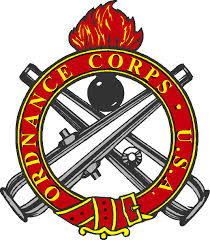
记忆方法
记忆“ordnance”这个单词,可以将它与“order”进行联想。想象一个“order”(命令)在军队或战争中被严格执行,这个命令关乎到“ordnance”(军火装备或武器)的管理和分发。通过这样的场景,你可以记住“ordnance”与军事装备有关的意思。
以上内容由AI生成, 仅供参考和借鉴
中文词源
ordnance 大炮,军需物资
来自ordinance的拼写截短形式。词义由命令引申为军事安排,排兵布阵,军事物资供给,后用于指武器,军械,大炮等。词义演变比较munition,artillery.
英语词源
- ordnance (n.)
- "cannon, artillery," 1540s, a clipped form of ordinance (q.v.) which was attested from late 14c. in the sense of "military materials, provisions of war;" a sense now obsolete but which led to those of "engines for discharging missiles" (early 15c.) and "branch of the military concerned with stores and materials" (late 15c.). The shorter word was established in these distinct senses by 17c. Ordnance survey (1833), official survey of Great Britain and Ireland, was undertaken by the government under the direction of the Master-General of the Ordnance (the natural choice, gunners being thoroughly trained in surveying ranges and distances).
权威例句
- 1. An Ordnance Survey grid reference gives the position of a place to within 100 metres.
- 全国地形测量局的地图坐标标示某地的位置精确到100米以內.
- 2. She worked in an ordnance factory during the war.
- 战争期间她在一家兵工厂工作.
- 3. Shoes and clothing for the army were scarce, ordnance supplies and drugs were scarcer.
- 军队很缺鞋和衣服, 武器供应和药品就更少了.
- 4. With cargo projectile by the world , serious problem of unexploded ordnance arisen.
- 子母弹药的应用与发展带来了严重的未爆弹药问题.
- 5. All non - EOD explosive ordnance disposal personnel must evacuate immediately.
- 所有 非 排弹人员立刻撤离.
